FINDING YOUR TRIBE
Theatre of Identity is a fascinating phenomenon: this genre promotes a particular people’s cultural identity and invites members of that culture and other cultures to experience that culture’s joys, problems, history, traditions, and point of view. Plays like Torch Song Trilogy, The Boys Next Door, and Yellow Face were written to shed light on minority issues that had previously been given short shrift by the American Theatre. Tribes, currently extended through January, 2013 at the Barrow Street Theatre, sheds light on the issues facing deaf people, and even though the play unfortunately falls apart in the second act, the strong ensemble effortlessly distracts from the shortcomings of the play’s dramaturgy.
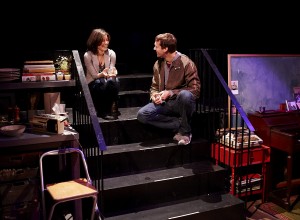 Tribes is the story of deaf Billy (Russell Harvard) who was born into a “creative” yet insular hearing family. When Billy meets the comely Sylvia (Susan Pourfar), who is slowly going deaf, his own life turns upside down, and he explores the non-hearing tribe beyond his hearing family. One of the play’s flaws is that Billy’s choice, to stay with his family or live in the deaf world, is presented as either/or situation, when in reality, there is no reason he can’t assimilate within both tribes. To further undermine her story, playwright Nina Raine has crafted Billy as a less than dynamic main character while his lively, crazy family’” loving him as best they can’”spins out of control around him. It’s never quite clear what Billy wants, especially as he pursues a woman who already has a boyfriend.
Tribes is the story of deaf Billy (Russell Harvard) who was born into a “creative” yet insular hearing family. When Billy meets the comely Sylvia (Susan Pourfar), who is slowly going deaf, his own life turns upside down, and he explores the non-hearing tribe beyond his hearing family. One of the play’s flaws is that Billy’s choice, to stay with his family or live in the deaf world, is presented as either/or situation, when in reality, there is no reason he can’t assimilate within both tribes. To further undermine her story, playwright Nina Raine has crafted Billy as a less than dynamic main character while his lively, crazy family’” loving him as best they can’”spins out of control around him. It’s never quite clear what Billy wants, especially as he pursues a woman who already has a boyfriend.
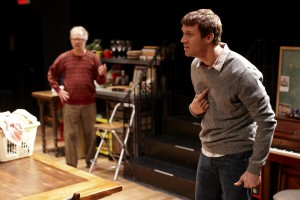 At its core, Tribes is Billy’s coming-of-age story; it is inevitable that Billy finally stands up for himself to cut the apron strings in order to grow up. But logic takes a back seat to ideas, and Act Two takes a few too many wrong turns culminating in a poorly executed storyline involving Billy’s dishonesty at a new job. What prevents Tribes from being reduced to a full-on afterschool special, aside from an abundance of profanity, is Raine’s well-articulated ideas about who gets to decide how the deaf community should communicate, either by lip-reading or sign language.
At its core, Tribes is Billy’s coming-of-age story; it is inevitable that Billy finally stands up for himself to cut the apron strings in order to grow up. But logic takes a back seat to ideas, and Act Two takes a few too many wrong turns culminating in a poorly executed storyline involving Billy’s dishonesty at a new job. What prevents Tribes from being reduced to a full-on afterschool special, aside from an abundance of profanity, is Raine’s well-articulated ideas about who gets to decide how the deaf community should communicate, either by lip-reading or sign language.
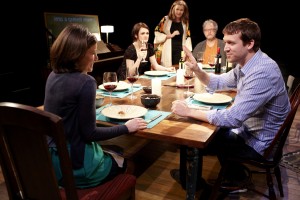 The most satisfying element of David Cromer’s (Our Town) production is the top-notch acting. Jeff Still’s opinioned, narcissistic patriarch is all bluster and passion while he defends anything related to the intellect. As the story unfolds, we see his life choices as more of a defense against a very difficult family dynamic that he has no control over. The consistently lovely Mare Winningham grows more graceful with each role. As the reasonable, kind hearted matriarch of the family, she is the play’s moral and emotional compass, reminding everyone under her roof of the need for empathy. Winningham has that rare gift of being able to fill a stage completely with her a rich inner life. Will Brand has the showiest role as the mentally ill brother, and he makes the most of Raine’s overwrought writing while actively maintaining the ensemble’s balance. Meghan Mea O’Neill (the understudy for Gayle Rankin the night I attended) rounds out the hearing tribe with a solid performance as the sister who has yet to live up to her potential.
The most satisfying element of David Cromer’s (Our Town) production is the top-notch acting. Jeff Still’s opinioned, narcissistic patriarch is all bluster and passion while he defends anything related to the intellect. As the story unfolds, we see his life choices as more of a defense against a very difficult family dynamic that he has no control over. The consistently lovely Mare Winningham grows more graceful with each role. As the reasonable, kind hearted matriarch of the family, she is the play’s moral and emotional compass, reminding everyone under her roof of the need for empathy. Winningham has that rare gift of being able to fill a stage completely with her a rich inner life. Will Brand has the showiest role as the mentally ill brother, and he makes the most of Raine’s overwrought writing while actively maintaining the ensemble’s balance. Meghan Mea O’Neill (the understudy for Gayle Rankin the night I attended) rounds out the hearing tribe with a solid performance as the sister who has yet to live up to her potential.
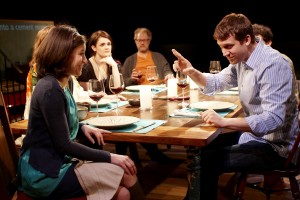 Deaf actor Russell Harvard’s Billy is most compelling when he connects with his rage and confronts his family in Act Two. His speaking ability is no match for his signing passion, but Cromer and Projection Designer Jeff Sugg remedy Harvard’s inarticulate line readings with elegantly placed projected titles. Susan Pourfar’s Sylvia is reduced to being a literal mouthpiece for Billy, but she has one intensely brilliant moment at the end of Act One that galvanizes the play and lets the audience see exactly why Billy is so compelled by her. The nuanced acting of this top-notch ensemble elevates this production above the script’s predictable tropes.
Deaf actor Russell Harvard’s Billy is most compelling when he connects with his rage and confronts his family in Act Two. His speaking ability is no match for his signing passion, but Cromer and Projection Designer Jeff Sugg remedy Harvard’s inarticulate line readings with elegantly placed projected titles. Susan Pourfar’s Sylvia is reduced to being a literal mouthpiece for Billy, but she has one intensely brilliant moment at the end of Act One that galvanizes the play and lets the audience see exactly why Billy is so compelled by her. The nuanced acting of this top-notch ensemble elevates this production above the script’s predictable tropes.
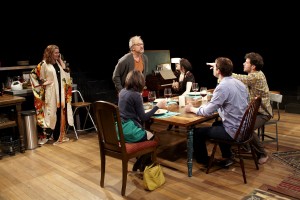 The design team also makes some strong choices, if not always used to full effect. Cromer and Scenic Designer Scott Pask (The Book of Mormon) have re-configured the usually unwieldy Barrow Street Theatre proscenium space into a theatre-in-the-round. The result, of course, is very intimate, but theatre-in-the-round functions best when the action flows in the direction of diagonals. Cromer seems to have ignored that rule while blocking the piece, and the result is less-than-optimal staging where actors are unnecessarily blocked from the audience at times; curiously, the production is well directed but poorly staged. The warmly designed great room’”a set filled with well-observed details’”provides ample playing space for all the nuanced nooks and crannies of the family’s house. It is when the play’s action leaves the home that the design goes wanting. A mattress on the dining room table and a party scene played in a side aisle come off as a bit awkward and less important than they actually are. Keith Parham’s lights further detach the audience from the action as several late night scenes are lit so dimly as to obscure actors when the play would have been better served were they more illuminated. Daniel Kluger’s sound design never rises above the incidental.
The design team also makes some strong choices, if not always used to full effect. Cromer and Scenic Designer Scott Pask (The Book of Mormon) have re-configured the usually unwieldy Barrow Street Theatre proscenium space into a theatre-in-the-round. The result, of course, is very intimate, but theatre-in-the-round functions best when the action flows in the direction of diagonals. Cromer seems to have ignored that rule while blocking the piece, and the result is less-than-optimal staging where actors are unnecessarily blocked from the audience at times; curiously, the production is well directed but poorly staged. The warmly designed great room’”a set filled with well-observed details’”provides ample playing space for all the nuanced nooks and crannies of the family’s house. It is when the play’s action leaves the home that the design goes wanting. A mattress on the dining room table and a party scene played in a side aisle come off as a bit awkward and less important than they actually are. Keith Parham’s lights further detach the audience from the action as several late night scenes are lit so dimly as to obscure actors when the play would have been better served were they more illuminated. Daniel Kluger’s sound design never rises above the incidental.
The conversation Tribes inspires about communication and community in the deaf world more than justifies this Off-Broadway production. It’s unfortunate that Raine has written a play where issues and ideas take precedence over storytelling, but seeing a terrific ensemble at work in a socially relevant world is reason enough to overlook the short-comings in the writing.
photos by Gregory Costanzo
Tribes
Barrow Street Theater in New York City (New York Theater)
scheduled to end on January 3, 2013 EXTENDED to January 20, 2013
for tickets, visit http://www.barrowstreettheatre.com/boxOffice.asp
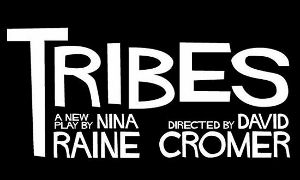

{ 1 comment… read it below or add one }
The night my friend and I saw this production we were both frustrated by our inability to hear and understand a lot of the dialogue. Some of this had to do with the staging. We were seated in the front row. The worst offender was the actor playing the Father; rapid speech and swallowed endings of words and lines. Mare Winningham was brilliant as usual. I bought a copy of the play a week later to see what I had missed. By the way, my hearing aids were in tip top condition as were those of my friend, a very successful actress. This was not the only play where inaudibility was a problem. It’s theater, folks; not film or T.V.